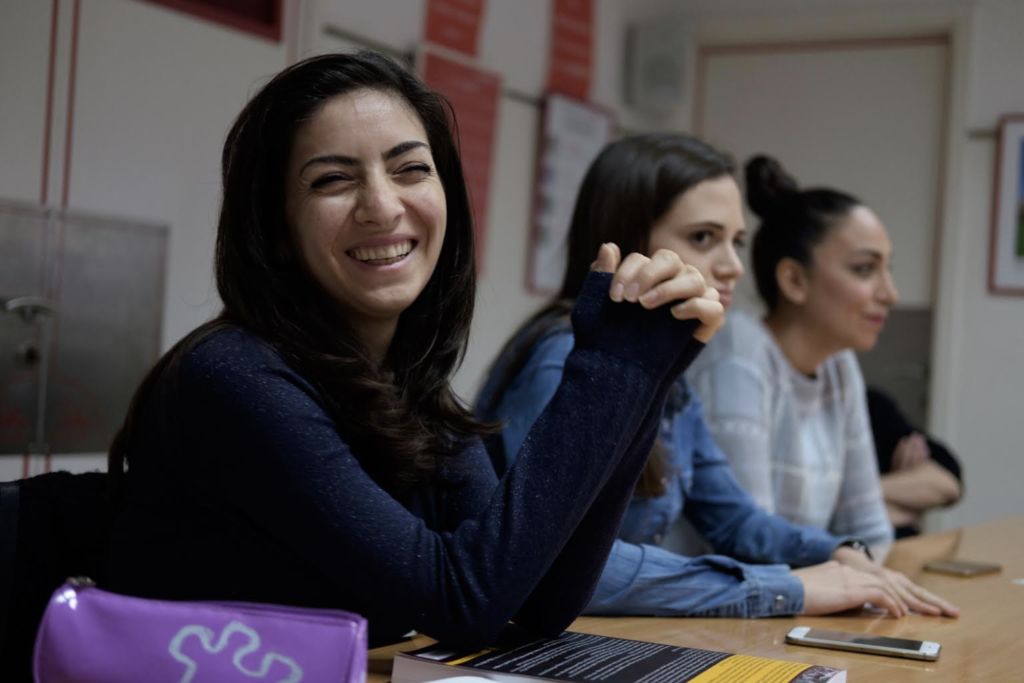The Entrepreneurial Spirit of Refugees

By: Tara Gerashi and Mikaela Bell / Arab America Contributing Writers
Imagine your home country disintegrates into violence. You gather your children and flee for your lives. Against all odds, you survive the conflict and the border crossings to move to a new country and are likely forced to move again. You learn new languages, dive into new cultures, acquire new ways of seeing the world – perhaps with little to no outside instruction. You work whatever jobs you can get, no matter how far below your skill set. You continue to care for your family. You continue to hope. What are you? You are adaptable. You are resilient. You are hard-working. You are intelligent. You are experienced.
You are a refugee.
The popular narrative continues to portray refugees as an economic burden – charity cases – instead of untapped talent. But refugees’ inclusion in the workforce is a strategic decision with long-term, sustainable benefits. They not only bring in diverse worldviews, experiences and expertise – they break down stereotypes while stimulating a general social and environmental consciousness.
First, refugees bring an entrepreneurial spirit to the table, which is crucial for economies. According to a study by Dany Bahar and Meagan Dooley at the Brookings Institute on the role of refugees and migrants in the economy, “Migrants engage in entrepreneurship at much higher rates than natives; in the United States, for example, migrants make up to 15% of the population yet represent 25% of entrepreneurs.”
A study by the New Economy found that in the years following the Great Recession, immigrants generally – about three million of whom are Arab – were twice as likely as other Americans to start a new business. A 2017 study in the Harvard Business Review found that “the U.S. is a major home for Arab inventors. In the five-year period from 2009 to 2013, there were 8,786 U.S. patent applications in our data set that had at least one Arab inventor.” This study included both immigrants and Arabs born in the United States, but the same study found that “immigrants from Arab countries tend to be in possession of higher education levels than the overall population or other immigrant groups.” Despite this, they experience discrimination in the visa selection process: “Skilled Arab immigrants are more likely than other major ethnic groups to arrive in the U.S. on a non-skilled visa.”
Many are familiar with the role of highly skilled immigrants in the transformation of Silicon Valley and similar success stories – Mo Gawdat of Google and Oussama Khatib of the Stanford Robotics Lab come to mind – but the New Economy study found that immigrants without a bachelor’s degree were still almost 25% more likely to start a business than the general American population. Such businesses – those run by immigrants with less formal education – make up 11% of the total U.S. economy. Another study reports that in 2015, businesses owned specifically by refugees generated $4.6 billion in income.

Incidentally, this entrepreneurial drive is also seen outside the United States. Bahar and Dooley found that in Turkey, which receives a very high number of refugees due to its proximity to current conflict areas, Syrian refugees started 6,033 formal companies and accounted for 39% of new foreign-owned firms between 2011 and 2017. In a report from 2019, the OECD found that more than one-quarter of immigrant-owned businesses in the EU were high-growth firms; companies owned by immigrants from North Africa and the Middle East clocked in with the highest probability of being high-growth, surpassing even firms owned by immigrants from China and internal immigrants from Western Europe (OECD). Eight years ago, Syrian refugee Ryyan Alshebl arrived in Germany; he was recently elected mayor of his new hometown.
Bahar and Dooley explain this vigor by pointing out that the very process of migration likely “preselects individuals with more entrepreneurial tendencies.” According to Philippe Legarin, refugee entrepreneurs’ success can also be due to the unique perspectives and experiences that they bring to the table. He points out that ‘‘people who have been uprooted from one culture and exposed to another tend to be more creative.’’ Legarin also cites various studies that show diverse groups outperforming like-minded experts at problem-solving.

However, refugees are valuable beyond entrepreneurship. The pandemic and economic crisis have shown the need for new and transformative business models, and the key to success in these circumstances lies in human resources. A recent study from the IBM Institute for Business Value shows that in the present economic environment, skills like crisis management, enterprise agility, resilience and adaptability are crucial for a company’s survival. There is no better time to hire refugees! Due to their experiences of displacement, refugees know how to skillfully navigate uncertainty. They are resilient, agile, and resourceful, and these kinds of “soft skills” can help organizations optimize their operations and management (McKinsey; OECD).
Furthermore, their cultural competency and adaptability set refugee candidates and businesses apart as ideal leaders of tomorrow. According to a study at the University of Southern California, these skills – along with empathy, intellectual curiosity, and 360-degree thinking – constitute “third space thinking,” the five most important attributes of successful leadership. In a world of teetering economies, proliferating violence, climate change, unstable population growth, and widespread dissatisfaction, recruiting and cultivating new generations of successful leaders will be key to the survival of businesses, countries, and a peaceful world.

Refugee-led innovation and entrepreneurial vigor have helped shape the success of social enterprises such as NaTakallam (“We Speak” in Arabic), which got its start when cofounder Aline Sara saw the waves of Syrian refugees pouring into her homeland of Lebanon. Sara, a Lebanese-American and one of Arab America’s women 40 under 40, has built a venture that enables refugees and conflict-affected individuals to leverage the freelance digital economy by enlisting them as online language tutors, translators and cultural exchange partners. Arabic was the first language on offer at NaTakallam, and it continues to be the most highly requested language, including its dialects, for the organization. NaTakallam enables refugees from Syria, Iraq, and Yemen, as well as conflict-affected individuals in Lebanon and Palestine, to access income and dignified employment regardless of their location or status. To date, its tutors and translators have self-generated almost $3,000,000 USD in cash income, while also meeting several of the UN Sustainable Developments Goals over the years.
In today’s fast-paced digital and physical economy, societies and organizations cannot afford to overlook the refugee talent pool. They are equipped with a reliable set of skills, especially soft skills, that are essential for a sustainable future of work, post-pandemic and beyond.
[1] Cindy Anderson & Anthony Marshall, ‘‘COVID-19 and the future of businesses: Leading executives highlight five key opportunities that will help organizations respond to crisis and change’’. IBM Institute for Business Value, September 2020.
[2] Dany Bahar and Meagan Wilson, ‘‘Refugees as assets not burdens: The role of policy. Brooke Shearer Series, No. 8, February 2020.[3] Philippe Legrain, ‘‘Refugees are not a burden but an opportunity’’. Organization for Economic Cooperation
Check out Arab America’s blog here!









